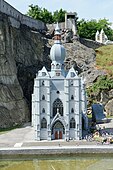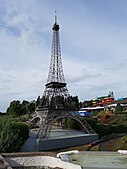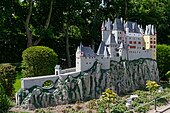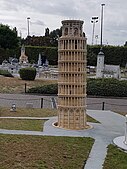 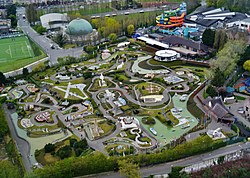 Mini-Europe viewed from the
Atomium | |
| Location | Avenue du Football / Voetballaan 1, 1020 Laeken, City of Brussels, Brussels-Capital Region, Belgium |
|---|---|
| Coordinates | 50°53′38″N 4°20′20″E / 50.894°N 4.339°E |
| Status | Operating |
| Opened | 1989 |
| Operating season | March–October |
| Website | Official website |
Mini-Europe is a miniature park located in the Bruparck entertainment park, at the foot of the Atomium, in Brussels, Belgium. Mini-Europe has reproductions of monuments in the European Union and other countries within the continent of Europe on display, at a scale of 1:25. Roughly 80 cities and 350 buildings are represented. [1] Mini-Europe receives 350,000 visitors per year [2] and has a turnover of €4 million. [3]
Mini-Europe is the brainchild of Johannes A. Lorijn, who founded similar miniature parks in Austria and Spain. [4] The park contains live action models such as trains, mills, an erupting Mount Vesuvius, and cable cars. A guide gives the details on all the monuments. At the end of the visit, the Spirit of Europe exhibition gives an interactive overview of the EU in the form of multimedia games. [5]
The park is built on an area of 24,000 m2 (300,000 sq ft). The initial investment was of 50 million Belgian francs in 1989, [6] [a] on its inauguration by then-Prince Philippe of Belgium. [7]
History
Inception, opening and growth

The original idea for the park originated from the Dutch businessman Johannes A. Lorijn who, in 1986, came up with the idea of creating a miniature park on the Heysel/Heizel site in Brussels. After his association with the Société régionale d'Investissement bruxelloise, which took a stake in the miniature park, he withdrew from the project following bad business fortunes. The park having already been sketched out and the models ordered, the Société approached the Walibi group, headed by Eddy Meeùs, about becoming a joint shareholder by taking over the designer's shares. In June 1988, Walibi's directors bought the business. [8] [4]
The revised plan consisted of a new park section at Walibi Belgium in Wavre, but that idea proved too large for the amusement park, so a search was made for a location where it could open as a separate park. Mini-Europe was eventually built on the old site of the Meli Heysel/Heizel amusement park, a branch of the West Flanders-based Meli Park, which had closed in 1986. [8] The initial investment was of 50 million Belgian francs. [6] [a] Mini-Europe opened in 1989 as part of Brussels' Bruparck entertainment park, which also housed a branch of the Kinepolis cinema chain and the Océade tropical water park, which closed in 2018. Then-Prince Philippe of Belgium inaugurated the site on 1 June 1989 with Thierry Meeùs at the helm. [4]
Mini-Europe proved less profitable than the theme parks owned by the Meeùs family. The turnover was between 100 million and 120 million Belgian francs in the first few years. [b] The Escurial Monastery, the Palace of Westminster, the Nyhavn in Copenhagen, the Grand-Place/Grote Markt, the Arc de Triomphe, the Leaning Tower of Pisa, the Parthenon and the Brandenburg Gate were among the first models visible to visitors. [8] Mini-Europe welcomed 300,000 visitors in 1998. [9] With 350,000 visitors in 2012 and €4 million in turnover, Mini-Europe has become one of Brussels' leading attractions. In 2018, 390,000 admissions were recorded. [10]
Neo Project and potential closure
Mini-Europe and Océade were threatened by the NEO project at the Heysel—a large shopping, residential and office project—and were originally due to close their doors at the end of 2013. This deadline was extended for a first time until the end of 2016. [11] [12] [13] Océade ultimately closed in October 2018. [14] Mini-Europe appeared to have an approved demolition permit in 2019. [15] The 2020 season, marked by the COVID-19 pandemic in Belgium, was initially announced as the park's last. [16] [17] Finally, an agreement was reached at the beginning of 2021 to extend operations until the arrival of NEO and to guarantee Mini-Europe's inclusion in NEO. [18]
Exhibits
Building the monuments

The monuments exposed are selected for the quality of their architecture or their European symbolism. Numbering 165, the designers and model makers are Belgian, British, Dutch, French, German, Portuguese and Spanish. [6] Most of the monuments were made using moulds. The pieces are constructed from a variety of materials, then copied by silicone moulding. The final copy used to be cast from epoxy resin, but nowadays polyester is used. [7] Three of the monuments were made out of natural stone (e.g. the Leaning Tower of Pisa and the Château de Chenonceau, in marble). A computer-assisted milling procedure was used for two of the models. After painting, the monuments are installed on site, together with decorations and lighting.
Many of the monuments were financed by European countries or regions. For instance, in 2008, Mini-Europe received: from the Hungarian Government, the gigantic Széchenyi Bath in Budapest (8 by 6 metres (26 by 20 ft) at Mini-Europe); from the Bulgarian Government, the Rila Monastery; and from the Government of Saxony-Anhalt (Germany), the Jahrtausendturm in Magdeburg. In collaboration with the Slovenian Government, Prešeren Square in Ljubljana was inaugurated with several Slovenian symbols. [19] The Brussels Grand-Place/Grote Markt model cost €375,000 to make. [7] The Cathedral of Santiago de Compostela required more than 24,000 hours of work. [5] Until 2018, no monuments from Rome were represented. The inauguration of the Trevi Fountain in 2019 to mark Mini-Europe's 30th anniversary filled this gap. [20]
Animations
In addition to static models, the park brings the site to life with a variety of animations: trains, windmills, sounds, the eruption of Mount Vesuvius, the fall of the Berlin Wall, gondolas in Venice, wire-guided lorries, etc. [21] These animations are industrial prototypes designed to withstand the many hours of operation and the different seasons (frost, rain, heat).
Gardens
Ground cover plants, dwarf trees, bonsais and grafted trees are used alongside miniature monuments, and the paths are adorned with bushes and flowers. These paths are accessible for Persons with Reduced Mobility (PRM). [21]
Spirit of Europe

At the end of the tour, the area reserved for the European Union gives a brief presentation of its history, its successes, its culture, the workings of its institutions, the single market and the reasons for enlargement, usually in the form of multimedia games. There are also many educational projects for schools. For all these activities, Mini-Europe has received the moral support of the European Commission and the European Parliament. [22]
List of models
Austria
Belgium
- Grand-Place/Grote Markt ( City Hall, City Museum, Flower Carpet and guild houses), Brussels
- Belfry, Bruges
- Town Hall, Leuven
- Castle of Vêves, Celles
- Citadel and Collegiate Church of Our Lady, Dinant
- Berlaymont building, Brussels
- Graslei (street) and Rabot, Ghent
- Alden Biesen Castle, Rijkhoven
- Grote Markt ( City Hall, Brabo Fountain and guild houses), Antwerp
- Curtius House, Liège
Bulgaria
Croatia
Cyprus
- Ancient Greek theatre, Kourion
Czech Republic
Denmark
- Viking ring fort
- Nyhavn waterfront, Copenhagen
- Børsen (old stock exchange), Copenhagen
Estonia
- Great Coastal Gate and Fat Margaret Tower, Tallinn
Finland
France
- Eiffel Tower, Paris
- Arc de Triomphe, Paris
- Basilica of the Sacré Cœur, Paris
- Centre Georges Pompidou, Paris
- Notre Dame du Haut, Ronchamp
- Clos Vougeot, near Dijon
- Château de Chenonceau, Loire Valley
- Royal Saltworks, Arc-et-Senans
Germany
- Speyer Cathedral
- Eltz Castle, Wierschem
- Holstentor, Burgtor and Salzspeicher, Lübeck
- Brandenburg Gate and Berlin Wall, Berlin
- Bonngasse (street) with Beethoven's birth house, Bonn
- Wies Pilgrimage Church
- Porta Nigra, Trier
- Osthofentor, Soest
- Jahrtausendturm, Magdeburg
Greece
Hungary
Ireland
- Glendalough monastery, County Wicklow
- Rock of Cashel, County Tipperary
- Gallarus Oratory, County Kerry
Italy
- Piazza dei Miracoli ( Leaning Tower, Duomo and Baptistry), Pisa
- Trevi Fountain, Rome
- Doge's Palace and St Mark's Campanile, Venice
- Palazzo Pubblico, Siena
- Villa Capra (La Rotonda), Vicenza
- Trulli of Alberobello
- Mount Vesuvius
Latvia
Lithuania
- Vilnius University campus, Vilnius
Luxembourg
Malta
Netherlands
- Munttoren and Montelbaanstoren, Amsterdam
- City Hall, Maastricht
- Hoensbroek Castle, Hoensbroek
- Church and houses, Ootmarsum
- Abbey and Kloveniersdoelen, Middelburg
- Museum village of Orvelte
- Weigh House and Tax Tower, Alkmaar
- Windmills, Kinderdijk
- Hoofdtoren and Oude Doelenkade street, Hoorn
- Town Hall, Veere
Poland
Portugal
- Belém Tower, Lisbon
- Castle of Guimarães
- Ribeira, Porto
- Traditional village of the Algarve
- Oceanarium, Lisbon
Romania
- Mogoșoaia Palace, near Bucharest
Slovakia
Slovenia
Spain
- Cathedral of Santiago de Compostela
- El Escorial, San Lorenzo de El Escorial
- Plaza de Toros, Seville
- Christopher Columbus monument, Barcelona
- Landscape with windmills, La Mancha
Sweden
Ukraine
United Kingdom
- Houses of Parliament and Elizabeth Tower, London
- Stratford-upon-Avon ( Shakespeare's birth house, Anne Hathaway's cottage, etc.)
- Longleat House, Wiltshire
- Royal Crescent and Circus, Bath
- Dover Castle
- Arlington Row, Bibury
Other
- Ariane 5
- Pride of Dover ferry
- An airport
- A Ferris wheel
- A North Sea oil platform
- TGV train
- Calypso ( Jacques Cousteau's ship)
See also
- Madurodam — model village in the Netherlands containing miniature famous Dutch landmarks
- Catalunya en Miniatura — miniature park located 17 km (11 mi) away from Barcelona, with an exhibition area of 35,000 m2 (380,000 sq ft) including all major buildings of Catalonia and of Antoni Gaudí
- Italia in miniatura — miniature park near Rimini, Italy
- Bekonscot — typical English village in miniature
- Huis ten Bosch — Japanese theme park modelled on the cities and landscape of the Low Countries
- Minimundus — miniature park in Klagenfurt, Austria
External links
-
 Media related to
Mini-Europe at Wikimedia Commons
Media related to
Mini-Europe at Wikimedia Commons - Mini-Europe official website
- Mini-Europe in Brussels
- Koshy, Yohann (27 April 2016). "These Photos of a Crumbling Pro-EU Theme Park Show a Europe in Existential Crisis". Vice. Archived from the original on 28 April 2016.
References
Footnotes
Citations
- ^ "Description - Mini-Europe". Mini-Europe. Retrieved 4 November 2017.
- ^ "Mini-Europe". Introducing Brussels. Retrieved 14 November 2023.
- ^ "Financial data of Mini - Europe". www.companyweb.be. 2019. Retrieved 9 March 2024.
- ^ a b c Wiersma, Jelte (11 May 2015). "Brussel verliest weer een pareltje: Mini-Europe moet dicht". EWmagazine.nl (in Dutch). Retrieved 8 March 2024.
- ^ a b "Flyer 2023" (PDF). Mini-Europe. Retrieved 14 November 2023.
- ^ a b c "Le tour d'Europe en 80 minutes". Le Soir (in French). 7 April 1989. Retrieved 7 March 2024.
- ^ a b c "Press Kit 2020" (PDF). Mini-Europe. Retrieved 14 November 2023.
- ^ a b c Eddy Meeùs, Hors des sentiers battus : Du Kivu à Walibi, Beersel, Éditions Clepsydre, September 2002, D/2002/8166/2 éd., 349 p. (ISBN 2-930304-07-3).
- ^ "La Belgique, une terre de parcs d'attractions". Le Soir (in French). 28 April 1999. Retrieved 8 March 2024.
- ^ "À 30 ans, Mini-Europe bat son record de visites". RTBF (in French). Retrieved 8 March 2024.
- ^ "Mini-Europa en Océade sluiten definitief de deuren". De Standaard (in Flemish). 5 March 2013. Retrieved 9 March 2024.
- ^ "Mini-Europa en Océade mogen toch op Heizel blijven". De Standaard (in Flemish). 14 June 2013. Retrieved 9 March 2024.
- ^ NWS, VRT (25 June 2013). "Mini-Europa en Océade tot eind 2016 op de Heizel". vrtnws.be (in Dutch). Retrieved 9 March 2024.
- ^ NWS, VRT (8 December 2016). "Mini-Europa blijft op de Heizel". vrtnws.be (in Dutch). Retrieved 9 March 2024.
- ^ "Sloopvergunning voor Mini-Europa is binnen". www.bruzz.be (in Dutch). Retrieved 9 March 2024.
- ^ "Mini-Europe va fermer ses portes à la fin de l'année". Le Soir (in French). 17 September 2020. Retrieved 9 March 2024.
- ^ Belga, La Libre Eco avec (9 March 2024). "Mini-Europe vise un redémarrage". La Libre.be (in French). Retrieved 9 March 2024.
- ^ "Definitief: Mini-Europa blijft dan toch in Brussel". www.bruzz.be (in Dutch). Retrieved 9 March 2024.
- ^ Methode (8 March 2024). "Brèves". La Libre.be (in French). Retrieved 8 March 2024.
- ^ Vanwelde, Aurélie (8 May 2019). "Mini-Europe fête ses 30 ans et inaugure la fontaine de Trevi". BX1 (in French). Retrieved 8 March 2024.
- ^ a b "The park". Mini-Europe. Retrieved 8 March 2024.
- ^ "Spirit of Europe". Mini-Europe. Retrieved 8 March 2024.

